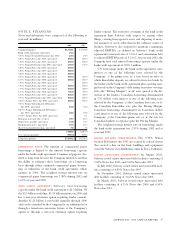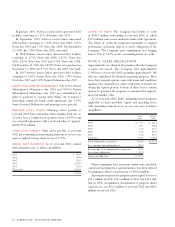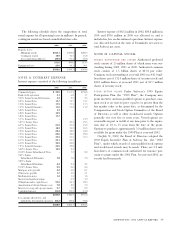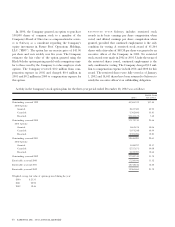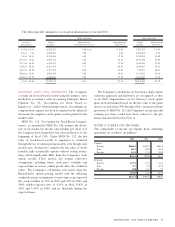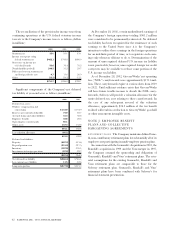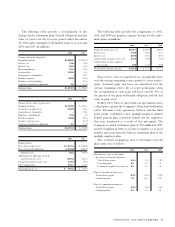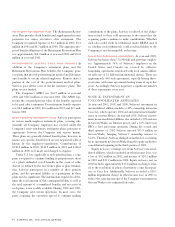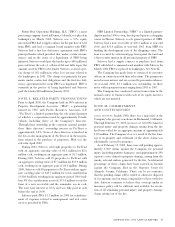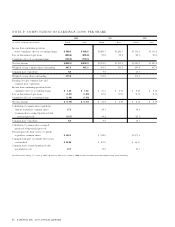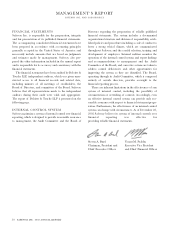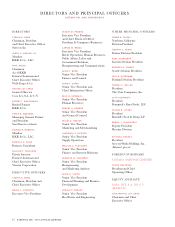Safeway 2002 Annual Report Download - page 48
Download and view the complete annual report
Please find page 48 of the 2002 Safeway annual report below. You can navigate through the pages in the report by either clicking on the pages listed below, or by using the keyword search tool below to find specific information within the annual report.
46 SAFEWAY INC. 2002 ANNUAL REPORT
On August 23, 2000, a lawsuit entitled Baker, et al. v. Jewel
Food Stores, Inc., et al. was filed in the Circuit Court of Cook
County, Illinois, against the Company’s subsidiary,
Dominick’s Finer Foods, Inc. (predecessor of Dominick’s
Finer Foods, LLC), and Jewel Food Stores, a subsidiary of
Albertson’s, Inc. The complaint alleged, among other
things, that Dominick’s and Jewel conspired to fix the retail
price of milk in nine Illinois counties in the Chicago area, in
violation of the Illinois Antitrust Act. The court certified the
lawsuit as a class action on behalf of all persons residing in
the nine-county area who purchased milk from the defen-
dants’ retail stores in these counties during August 1996 to
August 2000. Plaintiffs’ expert has calculated damages
against both defendants in several ways, ranging from $51
million to $126 million. If damages were to be awarded,
they may be trebled under the applicable statute. Plaintiffs
also seek an injunction enjoining the defendants from acts in
restraint of trade. On February 25, 2003, after three weeks
of trial, the trial judge, sitting without a jury, dismissed the
action at the end of plaintiffs’ case, and entered judgment in
favor of defendants. Plaintiffs have until March 27, 2003 to
appeal. The Company believes that the plaintiffs have no
meritorious grounds for an appeal and, if there is an appeal,
expects the judgment to be affirmed.
There are also pending against the Company various
claims and lawsuits arising in the normal course of business,
some of which seek damages and other relief, which, if
granted, would require very large expenditures.
It is management’s opinion that although the amount of
liability with respect to all of the above matters cannot be
ascertained at this time, any resulting liability, including any
punitive damages, will not have a material adverse effect on
the Company’s financial statements taken as a whole.
FURR’S AND HOMELAND CHARGE In 1987, Safeway
assigned a number of leases to Furr’s Inc. (“Furr’s”) and
Homeland Stores, Inc. (“Homeland”) as part of the sale of
the Company’s former El Paso, Texas and Oklahoma City,
Oklahoma divisions. Furr’s filed for Chapter 11 bankruptcy
on February 8, 2001. Homeland filed for Chapter 11 bank-
ruptcy on August 1, 2001. Safeway is contingently liable if
Furr’s and Homeland are unable to continue making
payments on these leases. In 2001, Safeway recorded a
pre-tax charge to operating and administrative expense of
$42.7 million ($0.05 per share) to recognize the estimated
lease liabilities associated with these bankruptcies and for a
single lease from Safeway’s former Florida division. During
2002, the accrual was reduced by $12.0 million as cash was
paid out. In addition, Furr’s began the liquidation process
and Homeland emerged from bankruptcy in 2002 and,
based on the resolution of various leases, Safeway reversed
$12.1 million of the accrual, leaving a balance of $18.6 mil-
lion at year-end 2002.
Safeway is unable to determine its maximum potential
obligation with respect to other divested operations, should
there be any similar defaults, because information about the
total number of leases from these divestitures that are still
outstanding is not available. Based on an internal assessment
by the Company, performed by taking the original invento-
ry of assigned leases at the time of the divestitures and
accounting for the passage of time, Safeway expects that
any potential losses beyond those recorded, should there be
any similar defaults, would not be material to Safeway’s
operating results, cash flow or financial position.
COMMITMENTS The Company has commitments under
contracts for the purchase of property and equipment and
for the construction of buildings. Portions of such contracts
not completed at year-end are not reflected in the consoli-
dated financial statements. These unrecorded commitments
were $129.1 million at year-end 2002.
NOTE N: DISCONTINUED OPERATIONS
In November 2002, Safeway announced its decision to sell
Dominick’s, which consists of 113 stores, and to exit the
Chicago market. In accordance with SFAS No. 144,
Dominick’s operations are presented as a discontinued oper-
ation. Accordingly, Dominick’s results are reflected separate-
ly in the Company’s consolidated financial statements and
Dominick’s information is excluded from the accompanying
notes to the consolidated financial statements, unless other-
wise noted.
As a result of the planned exit of the Chicago market,
the Company recorded a pre-tax loss from discontinued
operations of $787.9 million in 2002, consisting of $583.8
million in Dominick’s goodwill impairment, $201.3 million
in estimated loss on disposal of Dominick’s and $2.8 million
in loss from discontinued store operations. Pre-tax loss from
discontinued operations was $27.7 million in 2001 and
$76.4 million in 2000. Loss from discontinued operations
includes all direct charges to operations at Dominick’s as
well as allocated interest expense. Corporate overhead is
not included in discontinued store operations. Sales at dis-
continued operations were $2.4 billion in 2002, $2.5 billion
in 2001 and $2.5 billion in 2000.



